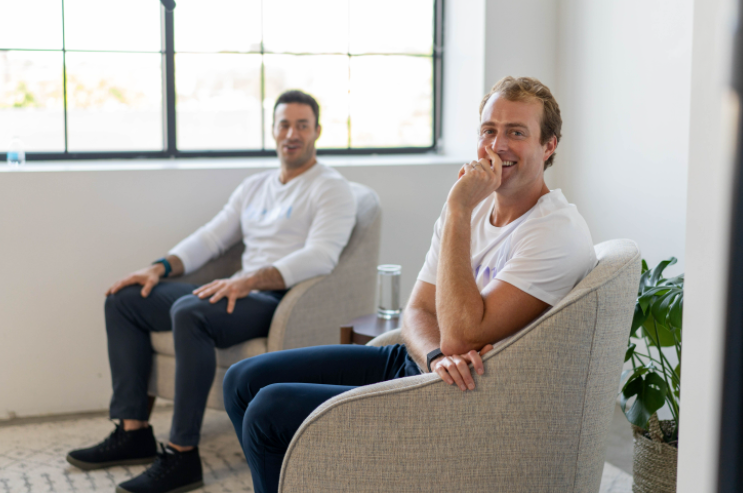Personal relationships can complicate business—but they can also add value to your company.
A wise friend once told me that you really only need three things in life:
- 1. Something to do (and not to just anything “to do”-- something that really lights you on fire)
- 2. Someone to love
- 3. And someone to love you.
It might sound far fetched, but at its most macro that’s really the dynamic we try to create with our team at Beam.
Management consultants will tell you to remain somewhat aloof in the office. They don’t want you to be close to your coworkers. Personal relationships, they warn, will corrode your ability to rule with objectivity, and if you’re the boss, you’ll struggle to reprimand under performers or pass out pink slips when the time comes.
There’s wisdom in the advice, and I’m sure it’s the best approach for plenty of founders. But I’ve considered the risk, and I’ve decided to take my team in as my adopted family.
I ask about their personal lives. I see them on weekends (when seeing people was still a thing) and allow myself to be vulnerable. I’ll gladly share my insecurities and fears, and as much as I would with a close friend, I encourage them to do the same. I’ve even heard half a dozen of my team cry. Sometimes the tears are work related. Building a brand at a rapidly growing startup is hard work, after all. But it’s more bearable when you have a team you can lean on.
The company I co founded, Beam, sells what I believe to be the highest quality wellness products on the market. I started it with Matt Lombardi, and we broke the rule of relationships before we made our first buck: Matt was also one of my best friends before we started Beam.
Yet despite whatever complications our friendship introduces, it’s also made the work more meaningful. I’m in the trenches with someone whose success and happiness I value as much as my own, and together with our team, we’ve raised millions of investment dollars, recruited a team of high-profile athlete partners, and established ourselves as a top-shelf brand in a wildly competitive market.
Two and a half years into Beam, Matt and I have about 15 team members. Our company isn’t a cult, but we’ve certainly established an intimate company culture. We love our employees, and we tell them as much.
The closeness might bite us in the ass at some point. But it’s almost impossible to imagine that any future hardship will outweigh the daily benefits that drive our company forward. Interpersonal relationships work for Beam, and here’s why.
We acquire talent we can’t afford.
You can separate prospective employees into “mercenaries” and “missionaries.” The former are motivated by the size of their salary, while the latter look for a complex blend of growth opportunity, autonomy, purpose, appreciation and love.
As a young startup, Beam can’t afford the mercenaries. I’m fine with that. But that means we need an enticing proposition for the mercenaries. In interviews, I generally spend the first half-hour asking applicants about their personal lives—relationships, hobbies, non-work interests, and so on. I ask about the most difficult moment they’ve ever experienced, how they responded, and what they learned from their brush with rock bottom. We rate prospective hires on a grit scale from 1-10 and will always give the gritty missionary a shot before someone with more experience. I’m a first time co-founder with no experience in e-commerce. The expert in everything was once a beginner. One of the best things about my job has been the ability to give some of our team members the ability “to do” (the type of “light you on fire” “to do” I mentioned earlier) exactly what they want with their career. That’s very fulfilling for me.
Personal questions give me a read on valuable qualities like grit and empathy, but they also provide an opportunity for me to demonstrate the open-book code at Beam. Mercenaries won’t see the value, but missionaries often recognize an opportunity to do their best work. And when they do, they’re willing to take a risk on us.
We all hope the gamble pays off, but that all depends on how well we operate as a team.
I can trust my employees to save me from my own mistakes.
Recently, Matt and I hatched a plan to launch Beam on a competitive e-commerce platform. Before we could iron out the details, our team came to us and told us it was a bad idea. They made a strong case, and in the end, we listened. We didn’t launch and when I connect the dots looking backwards it was one of the best decisions we’ve made.
Interventions like that don’t happen at companies with a strict hierarchy and stuffy workplace protocols. When people don’t feel free to express themselves, instincts and wisdom become siloed away from leadership, and the company squanders a potential competitive advantage. It’s simple, but this will always be our competitive advantage.
When Matt and I hire people, we want the full benefit of their brain power and the collective knowledge of their past experiences with other companies. We need them to tell us—the founders!—when we’re making mistakes. In a team built on trust, that’s no problem. Information and insight flow freely up and down the organizational chart. Oftentimes, I think I’ve learned a lot more from the team than they have learned from me.
The team is loyal.
People who like working on a close-knit team generally don’t want to work anywhere else. Alyssa, who handles our VP of Growth, provides a perfect example.
When she began working for us as a contractor in 2018, Alyssa had four other clients. She told us outright that she had no interest in accepting a traditional, full-time job. But as Beam’s needs ramped up, she started giving us more of her time. She dropped to three clients, then two. Nine months in, she was giving us all her energy, and we hired her full-time.
Since then, we’ve hired four other employees who started as contractors and told us they didn’t want to join the team full time. All of them came around once they got a taste of the company culture.
The team will move mountains for the company.
Wellness is a fast-growing industry, so to stay ahead of the competition, we have to be quicker and lighter on our feet. That often results in long and odd hour work: We occasionally find ourselves working weekends or Slacking at midnight to prepare a new website or product launch.
Fortunately I don’t have to beg the team to donate their nights and weekends. They do it willingly. The camaraderie that pulls us together also motivates us to push challenging initiatives through as a team, regardless of how hard the effort. And that gives us a huge edge over our competitors. We win and lose as a team.
A Gallup study of 230 companies found that employee engagement, or willingness to put in hard hours, was a key predictor of success. Compared to the bottom quartile, companies at the top experienced less turnover, fewer mistakes, and 21 percent more profit, on average. As for what drives engagement, the study’s authors note that high-quality relationships are critical. This translates to me simply as love and something “to do” (purpose).
I should also note that while Beam employees are willing to work crazy hours, they also have the freedom to take personal time as necessary. Part of the trust-and-care contract is that people are free to set their own schedules. To that end, Matt and I don’t count vacation days, and so long as the work gets done, employees are free to play afternoon hooky when they need to.
It’s fun to work with people you care about.
Look, building close relationships isn’t strictly about business success. Matt and I started Beam for a number of reasons, but one of them was that we wanted to surround ourselves with inspiring people. Both of us played professional sports. And we wanted our company to deliver the kind of camaraderie we’ve grown to love in dugouts and locker rooms.
Every Friday at 10 a.m., Beam holds a company call that lasts a sometimes agonizing 2+ hours. Everyone on the team dials in, and for the first 5-10 minutes we just shoot the catch up and make fun of each other. If I joined a Zoom with my family that is exactly how we’d spend the first 5-10 minutes. It’s a beautiful thing to be able to do that at “work.”
In two+ years, of course, we’ve had some bumps along the way with employees. I’m sure there will be more to come, and it will be tough. But I’ll deal with it then. In the meantime, I’ll enjoy growing closer to my team and working alongside some of the most inspiring people I’ve ever known. Not to be corny, but that's what life is about.





